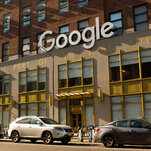Alphabet, Google’s parent company, gained ground in its most recent quarter against several of its lingering challenges, according to financial results released on Tuesday. The Google search engine’s ad business showed resilience despite growing worries about competition powered by artificial intelligence. YouTube, the Google-owned video platform, is starting to show momentum in its race against TikTok.
And while Google was slower than Microsoft to integrate generative A. I. into products, it appears to be making progress.
Alphabet posted $74. 6 billion in quarterly sales, up 7 percent from a year earlier and besting analysts’ estimate of $72. 9 billion, according to data compiled by FactSet.
The internet giant’s profit climbed 15 percent, to $18. 4 billion, in the second quarter, Google said, beating Wall Street’s expectations of $17. 1 billion.
Google and other companies dependent on digital advertising, such as Meta and Snap, have looked to reverse an ad spending slump caused by economic uncertainty, rising interest rates and inflation. In a statement, Google said it was aided by accelerating revenue from its search engine and YouTube in the second quarter. The search engine benefited from higher ad spending among retailers.
It’s difficult to determine if Alphabet’s rebound indicates that the broader online ad market is regaining strength. Google’s search engine tends to hold up well in both good and bad economic times. YouTube’s modest recovery does suggest things are getting better, though the company’s advertising technology division, which posts ads on websites across the web, lost ground on revenue.
Investors appeared to be relieved by the company’s improving ad sales. Alphabet’s stock price rose 6 percent in after-hours trading on Tuesday. In an earnings call on Tuesday, Sundar Pichai, Alphabet’s chief executive, said generative A.
I. allowed the company “to not always be constrained to how search was working before,” and would lead to innovation for its search engine. “This is our seventh year as an A.
I. -first company, and we intuitively know how to incorporate A. I.
into our products,” Mr. Pichai said. “These advances provide an opportunity to reimagine many of our products, including our most important product: search.
” Philipp Schindler, Google’s chief business officer, said in the earnings call that YouTube’s quarterly sales gains reflected greater stability in advertiser spending. But the recovery has not been universal. Snap, the parent of Snapchat, posted a on Tuesday, in a sign that the ad landscape remained rocky and that Google’s size and reach have given it more advantages in weathering the terrain.
Despite concerns of growing A. I. competition from the ChatGPT chatbot and Microsoft’s Bing search engine, Google’s search engine has remained a central gateway to the web for billions of users.
That has helped the company convince more advertisers that its sites are still a reliable way to reach consumers. The company has tried to refocus in other ways by shedding some projects that lacked promise, laying off 12,000 workers and consolidating two of its A. I.
labs to accelerate research in recent months. In May, Google introduced a number of A. I.
features and products at its annual conference, finally responding to ChatGPT’s maker, OpenAI, and Microsoft. But it remains too early to tell how these A. I.
tools will affect Google’s revenue expansion or bottom line, if at all. Google also announced on Tuesday that Ruth Porat, its longest-serving chief financial officer, would assume the newly created role of president and chief investment officer on Sept. 1.
In that position, she will be responsible for Alphabet’s experimental businesses, called Other Bets, and engage with policymakers around infrastructure, economic opportunities and other matters. Ms. Porat, who has been at Google since 2015, will remain chief financial officer until the company can find a successor.
Revenue from Google’s search engine, its largest business, rose 5 percent to $42. 6 billion in the second quarter, just above analysts’ estimate of $42. 2 billion.
Advertising sales at YouTube climbed 4 percent to $7. 7 billion, above the $7. 4 billion expected by analysts.
The division had reported declining revenue in recent quarters, amid increased competition from TikTok, but it finally reversed that slide. YouTube Shorts, a quick-clip competitor to TikTok, are watched by over two billion logged-in users every month, up from 1. 5 billion a year ago, Mr.
Pichai said on the call. Google Cloud, the company’s division that offers software and technology services to other businesses, recorded a 28 percent increase in sales, to $8 billion. Analysts had estimated $7.
9 billion. The division, which had long lost money until the first quarter, reported an operating profit of $395 million in the second quarter. .
From: nytimes
URL: https://www.nytimes.com/2023/07/25/technology/alphabet-google-earnings-second-quarter.html
